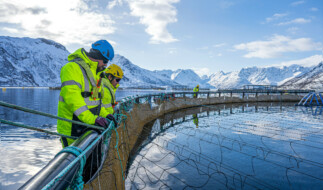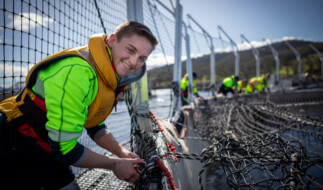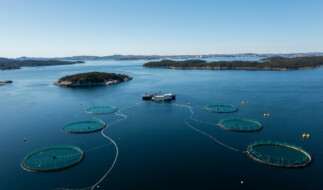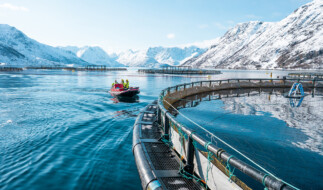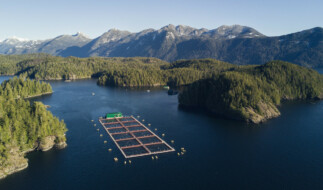In it together: What does collaboration look like in aquaculture?
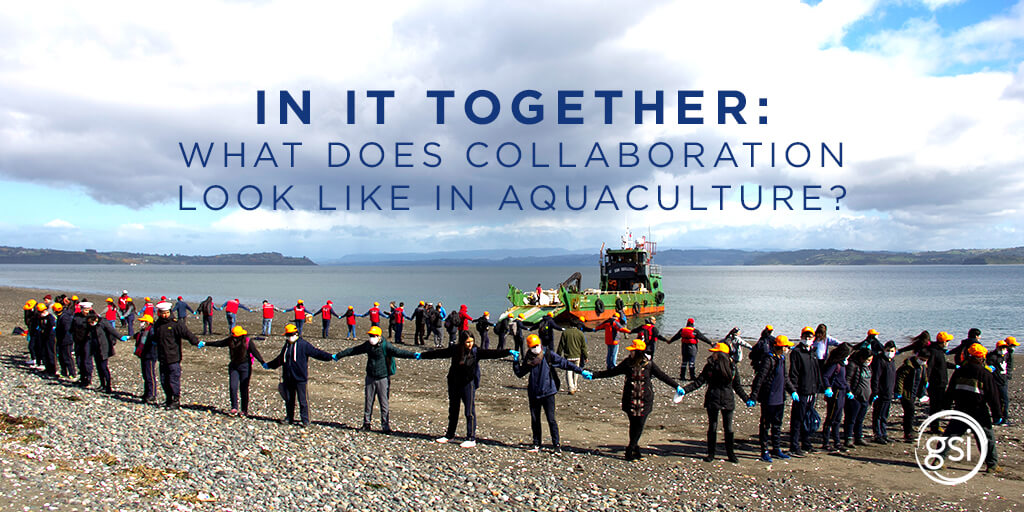
What does collaboration mean for the Global Salmon Initiative?
Collaboration is one of the core principles of GSI membership, as we believe the collaboration will help us drive significant improvements in the environmental performance of the salmon farming sector. Improved environmental performance, will not only allow the industry to grow sustainably it will also improve the choice consumers having in choosing sustainable seafood options.
GSI core principles:
- Collaboration
- Transparency
- Sustainability
Collaboration is part of GSI’s Pathways to the Future philosophy and is the mechanism that allows the initiative to thrive. For each of our selected priority areas – certification, biosecurity, sourcing of sustainable feed and improving industry transparency – by working together we can have a greater impact on improving the industry’s environmental performance than by working alone. In addition, we can speed up the rate of improvements. We know that our industry is not perfect and we face challenges, but by collaborating we can bring together our shared experiences to problem solve and identify ways to innovate and improve the salmon farming industry’s sustainability performance.
Collaborating on environmental improvements – ASC Certification
Becoming certified by the Aquaculture Stewardship Council (ASC) is not an easy task – it’s complex, time-consuming, and requires considerable resources but, regardless, GSI members are committed to achieving 100% ASC certification across their salmon farms. When GSI launched, no salmon farm was ASC-certified and we recognized it was going to take significant effort to get us there, but we knew it was necessary if we wanted the salmon farming sector to be regarded as a sustainable and responsible food provider. By sharing experiences with the Standard and working together to find ways to achieve the requirements of this standard, now over 60% of GSI members’ production is ASC-certified.
“When we joined GSI, we found it really refreshing and encouraging how the group was set up to support all the companies working towards ASC certification. It was not an area we were familiar with, or had begun working in before, but through the GSI network we were able to access the learnings from other industry members who had already become certified, and talk through the things we weren’t sure about. It took what seemed a daunting process, and made it much more tangible. We are now working hard to get our farms ready for the ASC audits, and if a challenge arises we know we are not isolated and can reach out to the GSI group for advice. Overall it has helped us and motivated us as a company to work towards the rigorous requirements of the standard in a manner we likely would not otherwise have done.”Patricio Urbina, Control and Management Manager, Salmones Australe
Local community collaboration: more than just good neighbors
For all GSI members, the desire for collaboration locally is driven by a genuine commitment to have meaningful and constructive partnerships with the communities in which we operate. From educating local communities on our operations, supporting skills-based training programs, participating in beach clean-ups, hosting events and supporting local sports teams we aim to be present and active in our communities. Some examples of how we do this are:
New Zealand King Salmon
New Zealand King Salmon has an education and youth development program. Working closely with schools in the region known colloquially as the ‘Top of the South’ (the north point of New Zealand’s South Island!), the program provides educational visits, such as class field trips to its farms and in-classroom aquariums for students to better understand salmon farming in the local area.
Cermaq Canada
Engagement with First Nation communities is very important to us as we operate in many of their traditional territories. Some ways we do this are by giving regular presentations on our activities to the Chief and councils, we also look to support local recruitment into our operations or working with First Nation-owned companies as suppliers. We also provide funding to support traditional cultural activities, such as canoeing expeditions, and youth sports events.
Collaboration within our immediate neighbors is a key part of GSI’s everyday work. Through collaboration, we can have an open and transparent dialogue with our communities to ensure our companies and operations provide a positive contribution to local economies and support local development.
“Our approach to community participation and engagement starts with looking for opportunities to support projects and initiatives which focus on an area of shared value for the community and us as an organization. Whether that be supporting local shoreline habitat restorations and beach clean ups or supporting programs that promote health, wellbeing, opportunities for youth and supporting Indigenous communities, we are proud to be a part of the communities where we live and work."Linda Sams, Sustainable Development Director, Cermaq Canada
Blumar Chile
In the spirit of building relationships and contributing to the local community, we continue to find ways to support our local artisanal fishermen, whose livelihoods are rooted in the areas where we operate. In support of the Fishermen’s Union of Caleta Anahuac, we provided equipment for their recently inaugurated sales hall that would bring improvements and efficiencies to the filleting process of the fish.
Regional collaboration: ‘Fjordfrende’ putting the environment first
Cargill and Skretting are two fish feed suppliers who are collaborating with the goal of providing efficient and sustainable feed delivery services for salmon farmers in Norway. Previously, cargo ships with Cargill’s feed would sail to farms along the Norwegian coast at the same time as other ships with Skretting feed. The companies realized that, despite being business competitors, there was a way to optimize the logistics process and remove inefficiencies in the transport chain as well as drastically improving the environmental footprint of transporting feed.
This initiative is supported by the European Union, and it is estimated that the efficiency improvement will reduce emissions of harmful greenhouse gases by one fifth per ton of fish feed transported. That equates to 15–20 million kg of CO2 per year, which is equivalent to removing 7,500 cars from the roads every year.
“We have named the collaboration ‘Fjordfrende’ which, in English, translates to ‘fjord friend’, because it is about working together for fjord-friendly transport.”Fredrik Witte, Managing Director at Cargill Aqua Nutrition, North Sea
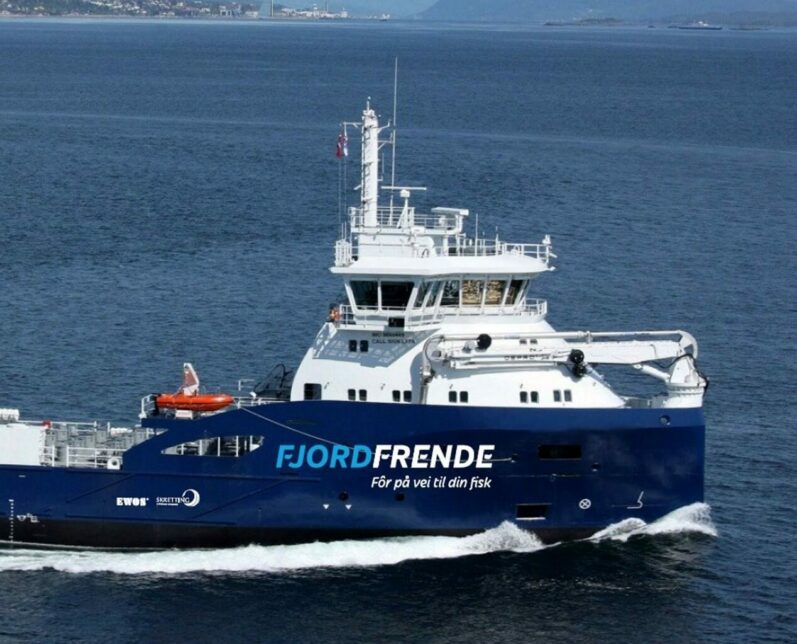
This logistics collaboration is based on trust, fairness, innovation and continuous improvement in a fully compliant environment. Fredrik Witte and Skretting Norway’s MD Erlend Sødal are still fierce competitors in every aspect of the fish feed business, but a transport collaboration will provide more efficient fish feed distribution and reduce emissions of harmful greenhouse gases and the overall associated carbon footprint.
Supply chain collaboration
GSI is pleased to work with several supporting companies and organizations that share its vision for improved sustainability in the farmed salmon sector.
One specific area where there is close collaboration between GSI and its Associate Members involves working out how to improve the sustainability of fish feed. Feed ingredients have an important role in the efficiency of salmon farming and provide the salmon with all the protein and essential nutrients required for optimal health and growth. But how do we do this without putting undue pressure on wild fish stocks or natural resources for feed?
Together with our Associate Members, we have supported a number of successful initiatives, such as finding alternative sources of omega-3 fatty acids through the launch of a feed tender calling on the development of novel oil sources, and reducing the amount of marine ingredients in the salmon feed, which has gone from 3:1 to 1:1 on average over the last 10 years.
“One of the biggest innovations to have taken place in salmon farming in the past decade is the significant reduction in the use of wild fish as part of the farmed fish’s diet. Through innovation and improvements in feeding techniques and ingredients, we have been able to both reduce the amount of marine resources needed, but also been able to identify new and novel resources to replace the marine oils we required before. We have also worked with the GSI partners to transfer this knowledge to developing aquaculture sectors too which further improves the industry’s sustainability profile.” Tor Eirik Homme, Director Feed and Nutrition at Grieg Seafood ASA
Global collaboration: partnering with like-minded organizations and initiatives
Working in partnership with other like-minded organizations is necessary if we want to see the global shifts in food production which are necessary for the future security and sustainability of food systems across the planet. GSI and our members are pleased to be involved in many global collaboration initiatives, from supporting the United Nations Sustainable Development Goals (SDGs), joining the Advisory Network for the High Level Panel on Sustainable Ocean Economies, and to co-hosting a ‘sustainable futures’ event with the World Wildlife Fund (WWF).
Future of Aquaculture
In June 2018, the WWF and GSI co-hosted a thought-leaders’ discussion at the World Bank in Washington, DC, USA, with the theme of looking to the Future of Aquaculture. Focusing on questions such as: ‘What barriers and opportunities might the industry face?’ and ‘What can we do now to help ensure the farmed salmon sector’s future is sustainable?’, and with the task of developing a road map to the future of aquaculture, the group of forward-thinkers discussed the possible challenges and opportunities facing the industry, and the potential change levers available. Some clear themes began to emerge, including how collaborations and partnerships will play an important role in accelerating the speed and scale of progress, and how innovation and technological advancements are required to enable sustainable growth. To help accelerate progress towards achieving this vision, the Future of Aquaculture Network was formed, to bring together organizations that want to work together to help trigger these and other identified change levers into action.
High Level Panel for Sustainable Ocean Economy
GSI has also confirmed its support and participation in the Advisory Network to the High Level Panel (HLP) for a Sustainable Ocean Economy, which brings together world leaders who recognize that economic production and ocean protection must be mutually supportive if we are to “produce, protect and prosper”. It is an initiative comprising serving heads of government who are committed to catalyzing bold, pragmatic solutions for ocean health and wealth that support the SDGs and for building a better future for people and planet.
As a member of the Advisory Network to the HLP, GSI will be invited to advise on the Blue Papers and recommendations that will come out of the HLP working groups, as well as play a key role in informing and incorporating the recommendations into practice.
By collaborating with like-minded initiatives who share our vision for a sustainable future for aquaculture, we are able to bring together shared expertise and experiences to problem solve and identify ways to innovate and make progressive improvements in industry sustainability. We can implement real and measurable change at a global scale that will help transform the aquaculture industry to meet the requirements of our future world.
Working together to make the biggest impact
Our planet and our food systems are facing significant threats from issues such as climate change and growing demands on resources. To combat these challenges we need to think differently, and while there are areas where collaboration is not possible, there are areas where we can have a significant impact by working together. One such area is improving environmental performance.
By working together on shared environmental challenges and aligning our goals for improvement, as discussed here, we have the opportunity to make a real impact – at scale and at speed. Collaboration requires truth, tangible objectives, and commitment from all sides. When successful, collaboration is the accelerator that can propel an industry in the right direction – and, for GSI, collaboration is moving us towards a more sustainable future for salmon farming and aquaculture.
